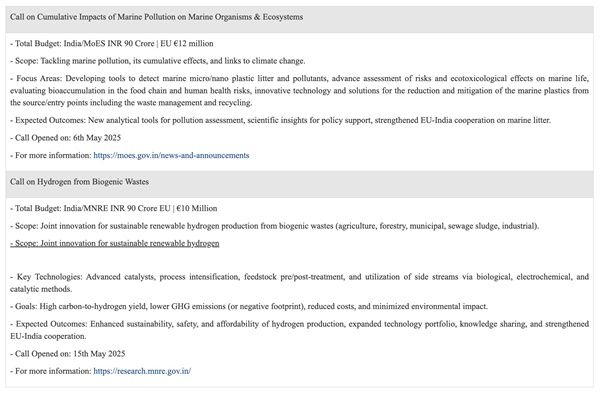India and the European Union have made a historic joint commitment of ₹391 crore (approximately €41 million) to establish two key research and innovation programmes focused on two of the most critical environmental issues of our time: plastic waste in our oceans and the creation of waste-to-hydrogen technology.
Key Highlights
The initiatives fall under the India-EU Trade and Technology Council, which has been set up to enhance cooperation in trade, technology, and sustainability.
The first call addresses fighting marine plastic litter, a threat to biodiversity, marine life, and human health. The collaborative call will help create cutting-edge tools for the detection, monitoring, and assessment of the cumulative effects of contaminants like microplastics, heavy metals, and persistent organic pollutants on marine ecosystems and food webs.
The second focus aims at meeting the imperative for sustainable energy through the creation of effective, low-cost, and ecologically sound means for the production of hydrogen from biogenic wastes such as agricultural, municipal, and industrial wastes. This research will aid in the implementation of both the EU's Hydrogen Strategy and India's National Green Hydrogen Mission to decrease greenhouse gas emissions and enhance energy security.
It is funded jointly by the EU (€12 million) and India's Ministry of Earth Sciences (₹90 crore), whereas the waste-to-hydrogen call has the support of the EU (€10 million) and India's Ministry of New and Renewable Energy (₹90 crore).
The synchronized calls will assemble researchers, startups, and industry across both regions with the aim to push innovation, circular economy, and energy efficiency, delivering scalable solutions with potential global reach.
The calls for research launched in May 2025 and should give rise to new analytical methods, policy-driven scientific understanding, and high-end technology portfolios both for marine pollution prevention and the production of green hydrogen.
Leaders and experts from both nations have highlighted that this cooperation is a reflection of the increasing pace in the EU-India relationship, with a common interest in sustainable development and a cleaner, more secure world.
Sources: Press Information Bureau, NewsOnAir, Office of the Principal Scientific Adviser to the Government of India
